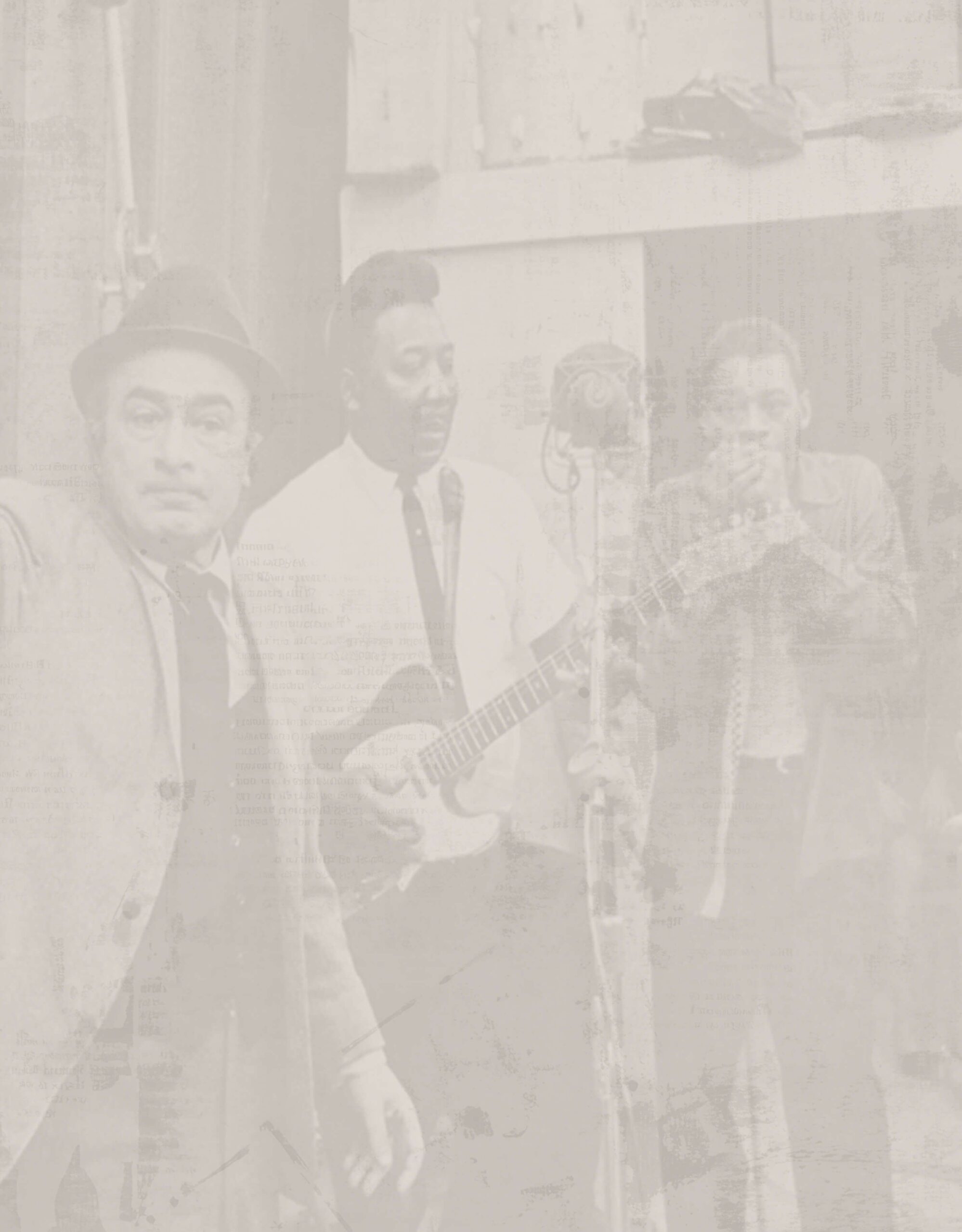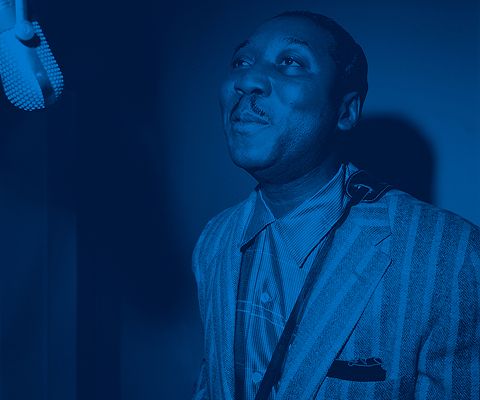Muddy Waters
Muddy Waters
“I first heard him as a little boy, and it scared me to death.” - Jimi Hendrix
The blues may have been born in the southern United States, but it grew up in Chicago, and Muddy Waters was one of the greatest to put his own stamp on this incredible sound. Waters’ upbeat, electric take on the blues proved not only popular in its time, but wildly influential to generations of rock musicians, from The Rolling Stones to Led Zeppelin.
Born McKinley Morganfield in Mississippi in 1913 and forged with a love of music by his local Baptist church, Muddy - so named by his grandmother for his love of playing in the creek near the former plantation on which he was raised - became a skilled guitarist and played harmonica for Delta blues legend Big Joe Williams. One fateful day in 1941, musicologist Alan Lomax came through town and recorded Muddy singing and playing guitar. Inspired by the experience, he soon headed north to Chicago to pursue music, becoming an opener for Big Bill Broonzy and switching from acoustic to electric guitar.
In 1947, Waters cut his first tracks for the Chicago label Aristocrat. That same year, a nightclub owner named Leonard Chess bought a stake in the company, soon bringing in his brother Phil; by 1950, they had full control of the label, renaming it Chess Records. And Muddy Waters was one of Chess’ most formidable artists: with bassist Willie Dixon writing most of his best-known original material, Waters turned songs like “Hoochie Coochie Man,” “I Just Want to Make Love to You” and “I’m Ready” into classics of the genre, along with unforgettable interpretations of numbers like “Got My Mojo Workin’” and “Mannish Boy.”
Muddy’s unique style of playing soon had a profound effect on musicians the world over. A 1958 tour of England helped introduce the country to the very idea of electric blues, and within a decade, bands from The Rolling Stones (who took their name from a single of Muddy’s) to Fleetwood Mac were following his influence. Waters would be a major festival draw for the rest of his career: 1960’s At Newport was one of the first live blues albums ever released.
With little to prove as the ‘60s wore on, Waters moved where the music took him. 1964’s Folk Singer was an all-acoustic blues affair that introduced a Chicago blues guitarist from the next generation named Buddy Guy. 1967’s Super Blues united Waters with Chess labelmates Bo Diddley and Little Walter (who got his big break in Muddy’s band), while 1968’s The Super Super Blues Band was an all-star summit between Diddley, Waters and his one-time rival Howlin’ Wolf.
Some time after Muddy Waters’ passing in 1983, B.B. King told a writer for Guitar World, “It’s going to be years and years before most people realize how greatly he contributed to American music.” Since then, this five-time Grammy winner earned posthumous inductions into the Rock & Roll Hall of Fame, a Grammy Lifetime Achievement Award, the subject of a U.S. postage stamp, and even had a crater on the planet Mercury named in his honor. It’s a safe bet that more than a few folks understand what King was talking about - and what Muddy Waters was playing.
The blues may have been born in the southern United States, but it grew up in Chicago, and Muddy Waters was one of the greatest to put his own stamp on this incredible sound. Waters’ upbeat, electric take on the blues proved not only popular in its time, but wildly influential to generations of rock musicians, from The Rolling Stones to Led Zeppelin.
Born McKinley Morganfield in Mississippi in 1913 and forged with a love of music by his local Baptist church, Muddy - so named by his grandmother for his love of playing in the creek near the former plantation on which he was raised - became a skilled guitarist and played harmonica for Delta blues legend Big Joe Williams. One fateful day in 1941, musicologist Alan Lomax came through town and recorded Muddy singing and playing guitar. Inspired by the experience, he soon headed north to Chicago to pursue music, becoming an opener for Big Bill Broonzy and switching from acoustic to electric guitar.
In 1947, Waters cut his first tracks for the Chicago label Aristocrat. That same year, a nightclub owner named Leonard Chess bought a stake in the company, soon bringing in his brother Phil; by 1950, they had full control of the label, renaming it Chess Records. And Muddy Waters was one of Chess’ most formidable artists: with bassist Willie Dixon writing most of his best-known original material, Waters turned songs like “Hoochie Coochie Man,” “I Just Want to Make Love to You” and “I’m Ready” into classics of the genre, along with unforgettable interpretations of numbers like “Got My Mojo Workin’” and “Mannish Boy.”
Muddy’s unique style of playing soon had a profound effect on musicians the world over. A 1958 tour of England helped introduce the country to the very idea of electric blues, and within a decade, bands from The Rolling Stones (who took their name from a single of Muddy’s) to Fleetwood Mac were following his influence. Waters would be a major festival draw for the rest of his career: 1960’s At Newport was one of the first live blues albums ever released.
With little to prove as the ‘60s wore on, Waters moved where the music took him. 1964’s Folk Singer was an all-acoustic blues affair that introduced a Chicago blues guitarist from the next generation named Buddy Guy. 1967’s Super Blues united Waters with Chess labelmates Bo Diddley and Little Walter (who got his big break in Muddy’s band), while 1968’s The Super Super Blues Band was an all-star summit between Diddley, Waters and his one-time rival Howlin’ Wolf.
Some time after Muddy Waters’ passing in 1983, B.B. King told a writer for Guitar World, “It’s going to be years and years before most people realize how greatly he contributed to American music.” Since then, this five-time Grammy winner earned posthumous inductions into the Rock & Roll Hall of Fame, a Grammy Lifetime Achievement Award, the subject of a U.S. postage stamp, and even had a crater on the planet Mercury named in his honor. It’s a safe bet that more than a few folks understand what King was talking about - and what Muddy Waters was playing.


